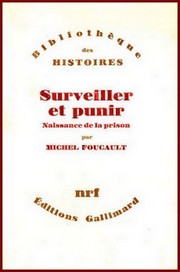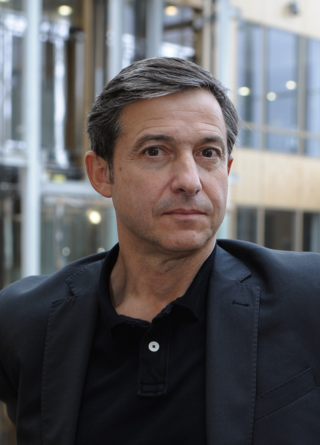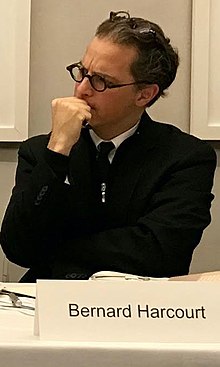Works
Harcourt's writings focus on punishment, social control, legal and political theory, and political economy from a critical, empirical, and social theoretic perspective.
In 2012, he published, The Illusion of Free Markets: Punishment and the Myth of Natural Order which explored the relationship between laissez faire and mass incarceration. [9]
In Illusion of Order: The False Promise of Broken Windows Policing he challenged evidence for the broken windows theory and critiqued the assumptions of the policing strategy. [10] In Language of the Gun, he develops a post-structuralist theory of social science, arguing that social scientists should embrace the ethical choices they make when they interpret data. [11]
He has also edited works by Michel Foucault in French and English. He is the editor of the French edition of Foucault's 1972 Collège de France lectures on Théories et institutions pénales (published by Gallimard in 2015) [12] and Foucault's 1973 Collège de France lectures on La société punitive (published by Gallimard in 2013). [13] He is the co-editor, with Fabienne Brion, of Foucault's 1981 Louvain lectures Mal faire, dire vrai. Fonction de l'aveu en justice. [lower-alpha 1]
In 2016, he published Exposed: Desire and Disobedience in the Digital Age, which explores how digital practices have transformed the circulation of power in contemporary society and produced what he refers to as a new "expository society". [14] Exposed was translated into French as La Société d'exposition and reviewed in Le Monde [15] and Le Figaro . [16]
In 2018, he published The Counterrevolution: How Our Government Went to War Against Its Own Citizens. [17] [18]
In 2020, he published Critique and Praxis, in which he analyzes the history of critical theory, and argues that theory and critical praxis "should inform one another uninterruptedly." [19]
The following outline is provided as an overview of and topical guide to critical theory:
Post-structuralism is a term for philosophical and literary forms of theory that both build upon and reject ideas established by structuralism, the intellectual project that preceded it. Although post-structuralists all present different critiques of structuralism, common themes among them include the rejection of the self-sufficiency of structuralism, as well as an interrogation of the binary oppositions that constitute its structures. Accordingly, post-structuralism discards the idea of interpreting media within pre-established, socially constructed structures.

Paul-Michel Foucault was a French philosopher, historian of ideas, writer, political activist, and literary critic. Foucault's theories primarily address the relationships between power and knowledge, and how they are used as a form of social control through societal institutions. Though often cited as a structuralist and postmodernist, Foucault rejected these labels. His thought has influenced academics, especially those working in communication studies, anthropology, psychology, sociology, criminology, cultural studies, literary theory, feminism, Marxism and critical theory.
Queer theory is a term used in various disciplines including literary analysis, philosophy, politics, and other fields cultural study. It functions essentially as a perspective that questions cisgender and heterosexual identities being perceived as the standard and provides a thesis that revisits that field with a "queer" approach.
The concept of a carceral archipelago was first used by the French historian and philosopher Michel Foucault in his 1975 publication, Surveiller et Punir, to describe the modern penal system of the 1970s, embodied by the well-known penal institution at Mettray in France. The phrase combines the adjective "carceral", which means that which is related to jail or prison, with archipelago—a group of islands. Foucault referred to the "island" units of the "archipelago" as a metaphor for the mechanisms, technologies, knowledge systems and networks related to a carceral continuum. The 1973 English publication of the book by Solzhenitsyn called The Gulag Archipelago referred to the forced labor camps and prisons that composed the sprawling carceral network of the Soviet Gulag.

The Frankfurt School is a school of social theory and critical philosophy associated with the Institute for Social Research, at Goethe University Frankfurt in 1929. Founded in the Weimar Republic (1918–1933), during the European interwar period (1918–1939), the Frankfurt School initially comprised intellectuals, academics, and political dissidents dissatisfied with the contemporary socio-economic systems of the 1930s. The Frankfurt theorists proposed that social theory was inadequate for explaining the turbulent political factionalism and reactionary politics occurring in 20th century liberal capitalist societies. Critical of both capitalism and of Marxism–Leninism as philosophically inflexible systems of social organization, the School's critical theory research indicated alternative paths to realizing the social development of a society and a nation.
Critique is a method of disciplined, systematic study of a written or oral discourse. Although critique is commonly understood as fault finding and negative judgment, it can also involve merit recognition, and in the philosophical tradition it also means a methodical practice of doubt. The contemporary sense of critique has been largely influenced by the Enlightenment critique of prejudice and authority, which championed the emancipation and autonomy from religious and political authorities.
Critical pedagogy is a philosophy of education and social movement that developed and applied concepts from critical theory and related traditions to the field of education and the study of culture.
Raymond Geuss, FBA is a political philosopher and scholar of 19th and 20th century European philosophy. He is currently Emeritus Professor in the Faculty of Philosophy, University of Cambridge. Geuss is primarily known for three reasons: his early account of ideology critique in The Idea of a Critical Theory; a recent collection of works instrumental to the emergence of Political Realism in Anglophone political philosophy over the last decade, including Philosophy and Real Politics; and a variety of free-standing essays on issues including aesthetics, Nietzsche, contextualism, phenomenology, intellectual history, culture and ancient philosophy.

Discipline and Punish: The Birth of the Prison is a 1975 book by French philosopher Michel Foucault. It is an analysis of the social and theoretical mechanisms behind the changes that occurred in Western penal systems during the modern age based on historical documents from France. Foucault argues that prison did not become the principal form of punishment just because of the humanitarian concerns of reformists. He traces the cultural shifts that led to the predominance of prison via the body and power. Prison is used by the "disciplines" – new technological powers that can also be found, according to Foucault, in places such as schools, hospitals, and military barracks.

Axel Honneth is a German philosopher who is the Professor for Social Philosophy at Goethe University Frankfurt and the Jack B. Weinstein Professor of the Humanities in the department of philosophy at Columbia University. He was also director of the Institut für Sozialforschung in Frankfurt am Main, Germany between 2001 and 2018.
Seyla Benhabib is a Turkish-American philosopher. Benhabib is a senior research scholar and adjunct professor of law at Columbia Law School. She is also an affiliate faculty member in the Columbia University Department of Philosophy and a senior fellow at the Columbia Center for Contemporary Critical Thought. She was a scholar in residence at the Law School from 2018 to 2019 and was also the James S. Carpentier Visiting Professor of Law in spring 2019. She was the Eugene Mayer Professor of Political Science and Philosophy at Yale University from 2001 to 2020. She was director of the program in Ethics, Politics, and Economics from 2002 to 2008. Benhabib is well known for her work in political philosophy, which draws on critical theory and feminist political theory. She has written extensively on the philosophers Hannah Arendt and Jürgen Habermas, as well as on the topic of human migration. She is the author of numerous books, and has received several prestigious awards and lectureships in recognition of her work.

Wendy L. Brown is an American political theorist. She is the UPS Foundation Professor in the School of Social Science at the Institute for Advanced Study in Princeton, NJ. Previously, she was Class of 1936 First Professor of Political Science and a core faculty member in The Program for Critical Theory at the University of California, Berkeley.

Kimberlé Williams Crenshaw is an American civil rights advocate and a leading scholar of critical race theory. She is a professor at the UCLA School of Law and Columbia Law School, where she specializes in race and gender issues.

Gabriel Rockhill is a French-American philosopher, writer, cultural critic, and activist. He is Professor of Philosophy at Villanova University, Director of the Critical Theory Workshop/Atelier de Théorie Critique, and former Directeur de programme at the Collège International de Philosophie.

Herbert Marcuse was a German-American philosopher, social critic, and political theorist, associated with the Frankfurt School of critical theory. Born in Berlin, Marcuse studied at the Humboldt University of Berlin and then at Freiburg, where he received his PhD. He was a prominent figure in the Frankfurt-based Institute for Social Research – what later became known as the Frankfurt School. He was married to Sophie Wertheim (1924–1951), Inge Neumann (1955–1973), and Erica Sherover (1976–1979). In his written works, he criticized capitalism, modern technology, Soviet Communism, and popular culture, arguing that they represent new forms of social control.

A critical theory is any approach to social philosophy that focuses on society and culture to attempt to reveal, critique, and challenge power structures. With roots in sociology and literary criticism, it argues that social problems stem more from social structures and cultural assumptions than from individuals. It argues that ideology is the principal obstacle to human liberation. Critical theory finds applications in various fields of study, including psychoanalysis, sociology, history, communication theory, philosophy and feminist theory.

Didier Fassin, born in 1955, is a French anthropologist and sociologist. He is the James D. Wolfensohn Professor of Social Science at the Institute for Advanced Study at Princeton University and holds a Direction of Studies in Political and Moral Anthropology at the École des Hautes Études en Sciences Sociales in Paris. He has been appointed to the Chair of Public Health at the Collège de France. Fassin was elected to the American Philosophical Society in 2022.

Santiago Castro-Gómez is a Colombian philosopher, a professor at the Pontificia Universidad Javeriana and the director of the Pensar Institute in Bogotá.
Elizabeth Bernstein is an American sociologist who is noted for her studies that focus on women, gender, and sexuality. She is also a professor at Columbia University's Barnard College.










